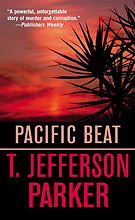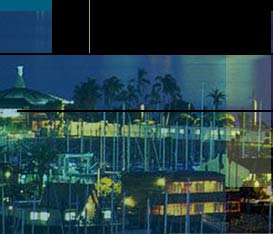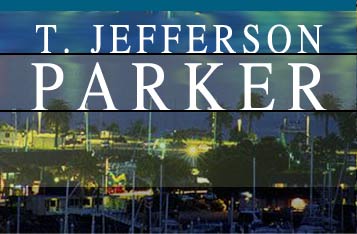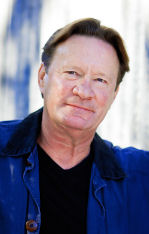
   

 




















|
|
|
 |
| US |
The main thing here is the Pacific. In the long run, the land and the people on it amount to only that. In the short run, a lot can happen.
The Franciscans ruined the Indians, the Mexicans bounced the Spanish, the Anglos booted the Mexicans and named the town Newport Beach. Dredgers deepened the harbor, and the people lived off the sea. There was a commercial fleet, a good cannery, and men and women to work them. They were sturdy, independent people, uneducated but not stupid. Then the tuna disappeared, the nets rotted, and the fishermen succumbed to drink and lassitude. Two wars came and went. Tourists descended, John Wayne moved in, and property values went off the charts. Now there are more Porsches in Newport Beach than in the fatherland, and more cosmetic surgeons than in Beverly Hills. It is everything that Southern California is, in italics. There are 66,453 people here, and as in any other town, most of them are good.
Jim Weir grew up on the Balboa Peninsula of Newport, in a bayfront home that, in one form or another, had been in his family for ninety years. The first Weir male to make it to the new world had fallen off the Mayflower at what is now Provincetown and drowned. Descendants of his pregnant wife later came west during the gold rush. Jim's great grandfather worked with the Newport Harbor tuna fleet and died in comfort, if such a thing is really possible. His grandfather fished the waters when they were still abundant. Success had gone skinny by the time it trickled down to Jim's mother, Virginia, who, with an air of stubborn efficiency, ran the cafe at Poon's Locker. Weir's father—Poon himself—died ten years ago of a stroke. His older brother was shot in the heart by a sniper at Nhuan Duc. His sister, Ann, operated a little day-care center two blocks from the home that the Weir kids grew up in, and slung cocktails at night.
Jim was a salvager by trade, a diver. He had worked ten years for the Sheriff's Department: one at the jail, two on the streets, five with the Harbor Patrol, two with Investigations. Then he quit to do local salvage work, and find an English pirate ship called the Black Pearl, which was sunk by Spanish warships off Mexico in 1781. So far as Jim knew, he hadn't even come close. He had lived most of his adult life aboard Lady Luck, in slip B-420 of Newport Harbor.
From his father, he had inherited a deep brow and dark hair, a humorless face, a frame that carried weight without announcing it, and an outward calm that could be mistaken for dullness. He had his mother's pale blue eyes, big hands that had always looked ten years older than the rest of him, and a temper that lived uneasily beneath the calm. He was reserved in the odd way that born Californians can be—a kind of knowing reticence that amuses Easterners, and has little to do with beach beer commercials or the common parodies of cool. To be cool is to be ready. Jim was thirty-seven, strong built, never married, and occasionally employed. In the ways that matter, he was still looking for his first big score.
He stood on the ferry as it slid across the bay from Balboa Island to the peninsula. Lights wobbled on the black water and the bay rang with the pinging lanyards of sailboats. A May breeze came straight on shore, pressing its cool hands against Jim's face. The Newport Beach police helicopter droned above, then banked away, trolling for crime by spotlight. Jim looked across to the houses clustered on the other side and almost smiled to himself: the old neighborhood. Awful good, he thought, to be home again.
Weir had spent the last six months in Mexico diving for the Black Pearl, and his last thirty-four days as a special guest of Mexican police in Zihuatanejo, Mexico. He had scratched the cell wall with his thumbnail each dawn when the roosters outside woke him in the stinking darkness. Jim had lost fifteen pounds, two thousand in cash, some very good dive and salvage gear, and his home, Lady Luck. The charges were drug-related, false, and, for reasons that Weir was not told—dropped. The policia clerks released him with his wristwatch, the clothes he was arrested in, and bus fare to San Diego. To the Zihuat cops, zero tolerance was a venerable tradition.
The ferry groaned, slowed, then settled against the ramp. Jim stepped off, his legs unsteady: Beans and bad water take their toll on muscle tone. He moved down the sidewalk and wound through the tourists, breathing deeply the salt air, the fumes of cars idling in the ferry line, the smell of beached seaweed. The Fun Zone cast pink lights onto the sidewalk and someone screamed from the top of the Ferris wheel. The tourist girls looked pretty as ever. Were they all getting younger or what? He listened to the sound of his boots on the cement, felt the jarring of his weakened legs with each step, and again he almost smiled: Mom will be at the Whale's Tale, having a glass of wine, and Ann will be there serving it to her. Raymond's probably on patrol, working the night shift. Home, man, home.
He was right. His sister, clad in a dumb sailorette outfit that showed off her legs, was standing beside a window booth, yakking it up with Virginia. His mother was huddled in the pale yellow windbreaker that matched her hair. Ann had her back to him. Jim walked up quickly, wrapped his hands around her waist, buried his nose in her pretty blond waves, and snorted like a hog. She elbowed him sharply, turned, and threw her arms around him. He hugged her and looked down at Virginia who sipped her wine and offered him a rare smile.
Ann spun him around and pushed him into Virginia's booth. "Two months and not even a postcard? Did you find it? Why didn't you write? God, you're skinny. You all right? Does Ray know you're back?"
"Yes, no, jail, yes, no. Boy, I'm hungry."
"Jail? My God, Jim." Ann felt his forehead like the mother she would never be. Jim could see three dark spots in the blue of her left eye, which he had always thought of as islands in a sea. She was two years older than he, but looked five years younger.
Virginia placed one of her big gnarled hands against Jim's ribs. "What happened son?"
"First can I have some food?"
Ann's jaw dropped in mock affront. "I spend six months worried sick about you, and you want some food. Here, eat this." She dangled the navy blue napkin in front of him.
"Frisky tonight aren't we?"
"Oh gee, am I really? Then let me fulfill my life's work and locate you some food."
"You look good, Annie. Your skin is rosy." Jim noted without comment that she had lost some weight, that the fret lines between her eyes had deepened.
"It's just the Mop 'n Glow I use. But thank you ever so much. Excuse me, irritation calls from the corner four top."
Jim ate some bread and clam chowder, more bread, a swordfish dinner, cheesecake for dessert, and drank most of a liter of house red. He recounted his Mexican misadventure in installments, whenever Ann could come by the table. He left out the beating he received on the night he was arrested, because it had hurt too much then to talk about now. Weir long ago had discovered that words made some things worse, that silence confuses the devil, that dumping misfortunes on loved ones is akin to using the pot without shutting the bathroom door first. To Jim, the true heartbreak in Mexico was not in failing to find the Black Pearl, or the beating, or the rank sickness in the Zihuat jail, but the fact that his boat—his home, and everything on it—was gone. Only now, back stateside, did the loss seem actual. Until now, fear had hogged the emotional road, but Jim was starting to just get pissed. Fuentes was right: A gringo in Mexico is euthanasia. By the time Jim finished his story, he had avenged himself in a dozen half-plotted, violent imaginings, but he was so tired he could hardly keep his eyes open.
"You need some sleep, son. Stay with me in the big house. Your bed's still made up and I ran your truck once a week like you wanted. Becky would like a call."
Ann bent over and hugged him. "You stay where you are until my surprise gets here. And guess what? Ray and I are having a party on Friday. Be nice and I'll invite you."
Jim asked about the occasion, but Ann was vague and coy, as she often was. A cup of coffee later, Jim looked up to see Ann's husband, his oldest and finest friend, coming toward the table. Newport Beach Police Lieutenant Raymond Cruz walked across the floor with his usual graceful slowness, his gun, stick, radio, and assorted equipment neat around his waist, as systems heavy as any cop on the beat. Jim felt a surge of happiness for which he wasn't prepared. Ray smiled widely, threw open his arms—left hand low and right hand high—and caught Jim in a bear hug. Jim could feel the strength in Ray's hands as they slapped against his back. It was an embrace of thankfulness. Raymond broke away first, and regarded Weir. "You look busted," he said.
Jim nodded. "You were right. They took it all."
A darkness passed through his eyes: Raymond's first instinct would be to return there and take it all right back. He kissed Ann, bent down to peck Virginia, then turned again to Jim with a look of incomprehension. "How many times did I try to tell you?"
"Too many. I don't want to hear it again."
"You don't want to listen, you don't want to hear. My friend, dumb as a stick. How can it be so goddamned good to see you?" For a moment he stood there, reading Weir's face with his bright, clear stare. Then he looked at Ann, who simply, for a moment, beamed.
"Tell him," she said.
"You tell him, Ann."
She stepped forward, reached down, and placed Jim's hand against her stomach. "How's Uncle Jim sound?"
For just a moment, Weir was speechless. Ann could not conceive. Armies of doctors had told her that, and twenty years of marriage had proven them right. And here, suddenly, what could not happen had happened—the simplicity of miracle showed plainly on her face.
Then she raced along with the details, using words that once had curdled her with jealousy: seven months to term, a December baby, sick this morning, got to get the house ready, still haven't picked names.
Jim saw that she already had entered the world where no man could follow, the parallel universe of motherhood. He had never seen such a thorough joy in her. Even Virginia had a sort of giddiness. Raymond's posture had changed—head a little higher, neck a little straighter—and there was a new roundness to his trim Latin features.
"Annie," said Jim, "you'll be the best—uh—second best mom in the world. It was worth getting skunked in Mexico to come home and hear this." For as long as he could remember in his adult life, Ann had wanted a child. She had kept the faith.
Ann smiled freshly, as if realizing all over again the blessing that had befallen her. She caught herself, reigned in her joy and proposed breakfast in the morning at the big house, where Jim could "tell us what really happened" down in Mexico. This decided, Raymond kissed her lightly again, then checked his watch. "Back to the mean streets of Newport," he said. "Glad you're here, Jim. See you tomorrow."
He walked across the floor with a final turn back, a smile that was aimed at Jim but strayed quickly to his wife.
Five minutes later, Weir felt the exhaustion hit him. He downed another half glass of wine and stood. "Don't anybody wake me up before noon."
© T. Jefferson Parker

|
 |
 |





